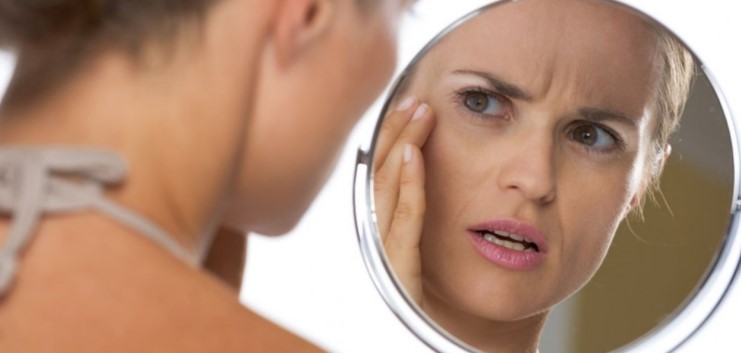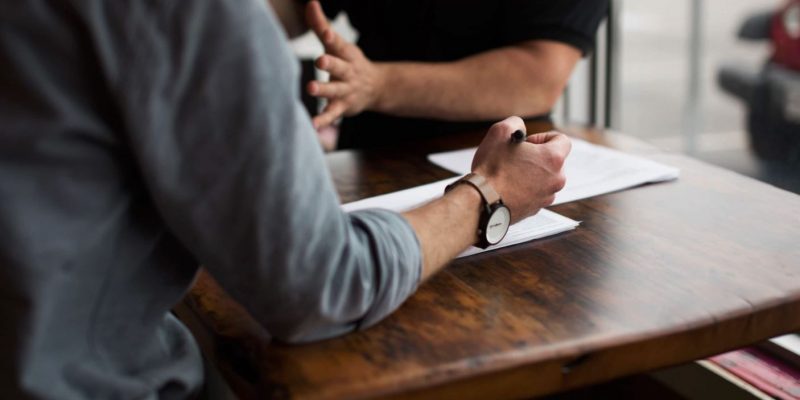You read that right, mirror gazing, as in gazing at one’s own reflection in the mirror. Sounds like a familiar mythology story, right? That’s where the comparison stops though. Because what you’re about to read here is not about narcissism.
Mirror meditation is an open-eye voyage that can take you very far, beyond your own expectations. Read on to learn about this lesser-known technique in the world of mindfulness and see if you wish to give it a go.
What happens when you look in the mirror – literally
If you stare at yourself in the mirror in a dimly-lit room for a duration of 10 minutes, your brain will begin to dwarf the contours of what it sees. You could then be faced with a pretty scary illusion. The scariest about that? The fact it’s perfectly normal!
At least that’s what a study conducted by Italian scholars in 2014 and published in Scientific World Journal concluded. In fact, it was patients suffering from depression who showed the least incidence of this happening. So if you see a monster, an animal face or anything strange staring back at you, take it as a good omen. The controls in the study reported seeing such visions.
But enough of monsters and strange creatures. Because that’s not quite what mirror gazing is about in the sense of mirror meditation.
The effects on your personality
Although it is normal for a tired and bored brain to start deforming the reflected image of oneself in a mirror in a dimly-lit environment, what is of particular interest here is the practice of mirror meditation to improve self-awareness and self-compassion.
It can take a little practice, because we’re so used to looking in the mirror to check for imperfections. This is not a pouting exercise but rather a confidence builder. Because no matter how many likes you get from showing yourself in the best light on social media, it doesn’t say a lot about how well you like yourself. In order to find out, you’ll have to do away with filters. It means you’ll have to just look at yourself, without scrutiny. Forget about which part could do with more make-up or jewellery to be more attractive to others. Find out what face you’d like staring back at you instead, and work on that.
Where to start mirror gazing
The best place to start practicing should be a comfortable place in a room with little distractions, so you don’t have to get up after thirty seconds to turn off the TV or decide to make a cup of tea and open the biscuit tin. I actually covered this in a previous article about Psychomanteum which is what a room in a house dedicated to this kind of activity is called. The tough part with meditation is actually just to stick with it. If ten minutes seems unmanageable, begin with a couple of minutes and work your way up.
Now you’re all set, focus on your breathing. Relax and look inside the mirror. Assess what emotional state you are in and contemplate yourself without judgment. Acknowledging one’s feelings forms the core of all meditation techniques, yet is easily achievable with a mirror because we are wired to respond to emotions. Your state of mind will stare you in the face, as it were.
Mirror-gazing is safe for anyone to do, because there is no pressure to look any way at all. Contemplating your sad or anxious face is ok, too. At first, this may well be what most of us could experience. The very act of looking at the person in front of you – the mirrored image of self – is already a game changer. Why? Because it fills your need for interaction, as the mirror presents you with a human face, albeit your own. Research shows that this exercise is effective in reducing feelings of despair.
Rather than breeding vanity and arrogance like it does in the Greek mythology character of Narcissus, looking at your own image from a reflection is an impressive medium for practicing self-awareness.
How deep is the person in the mirror?
Pr. Tara Well, research scientist at Barnard College, Columbia University, discovered mirror gazing for herself before she developed research in this field and started spreading the word through lectures, courses and Ted talks.
As a research fellow, she had to discover for herself if what applied to herself could indeed apply universally. She conducted an experiment where participants were simply asked to mirror-gaze for a length of time. The results were clear on one thing: all participants benefited in one way or other. But of course, as with most things, there is more to mirror gazing than meets the eye. The intensity and meaning you are able to put into it can peel away layers of deceit and let you see yourself in the light of your own truth.
Here is a clip from the TEDx talk Tara Well did on the subject:
Chances are you will find out a lot more depth to yourself than you ever suspected. Known effects include the following:
A way to nip self-criticism in the bud
To mirror gazing expert Pr. Tara Well, it came as no surprise that participants would experience the quite uncomfortable truth that comes from, erm… looking in the mirror. Doing so leads you away from reflecting on surface appearance quicker than one might like to think.
The good news, please, I hear you ask? The key to becoming compassionate with yourself is to just keep staring.
Do as you would during a closed-eye meditation, which is to drown out any polluting thoughts or nagging criticism while looking at your own face in the mirror.
The experiences of kind contemplation that repeatedly come from mirror gazing will eventually completely lift any remaining self-criticism that may have previously been weighing you down. Let your thoughts wash over you and keep going. Your perception of yourself will soon become a whole lot sunnier.
It works like this: because you keep looking with benevolent intentions, you soon process this compassionate gaze as a kind-hearted expression of love. That’s the simple trick to turning self-criticism on its head. Just peacefully contemplate your own features and let yourself be engulfed in the fuzzy feeling that comes with acceptance.

A way to tackle what you fear, head on
Have you ever looked away from a reflection of yourself because you were afraid of what you’d find? An overworked look, a sad face? Everyone knows that burying your head in the sand doesn’t solve problems, it only allows them to get bigger. Yet it’s an impulse that’s hard to repress.
Precisely because we all know how hard it can be to face one’s own demons, we often choose to look away.
The mirror-gazing experiment is a non-judgmental way to get going on the right path. It doesn’t involve any work or timeframe. It just sets you up for success.
We as social creatures need face-to-face contact in order to thrive. The feedback you get about yourself from each eye contact is food for the soul. You need it just as much as the air you breathe.
Without going schizophrenic here, the relationship between your mental self and your physical self can be taken just like any other social interaction. When you look into the mirror, you begin to interact with yourself on a meaningful level. This incredibly straightforward practice can alleviate feelings of distress, preparing you to confront dark thoughts when you’re ready. So you can ultimately tackle them.
Again, the key to this is the absence of deadlines and following your own pace. Self-acceptance has surprising effects, such as growing a thick skin and boosting your strength to name a few. Focusing on yourself regularly in a compassionate way carries immense advantages, including shaking away fears of inadequacy, incompetence or abandonment.
A take away to carry home with you
Just as naturally as a mirror-gazing routine shakes off bad feelings about yourself, you may find that it also translates into healthier relationships. Because the minute you work out your fears, your face relaxes and your smile becomes broader. Is it any wonder, then, that the effect on others can only be positive? What’s the name for this? You got it: mirroring.
Much in the same way that a guarded, tight-lipped face tends to divert sympathies, a happy outlook on oneself shines through and acts as a magnet for kindness. Even your nearest and dearest will engage with you in a different way.
In fact, mirror gazing can free you from negative patterns you’ve felt entangled in ever since you can remember. Roles of victimhood or competition between siblings often carry over from childhood well into adulthood. After revisiting some of these issues thanks to the open door that mirror-gazing holds open for you, be the first to offer a smile and drop your guard. Guess what happens then? Your brother or sister acts surprised and has no other option but to deal with you in a whole new fashion.
The teachings from looking at yourself straight in the eye are twofold. First, you learn about yourself. Second, you learn to change what you want to reject. You’ll be a different person.
A way to stay focused
From around eighteen months, children are able to recognize their own reflection in a mirror. This is an important step in the construction of self-awareness. News to many of us is that this skill should be harboured throughout life. Checking in with yourself and practicing self-compassion gives you a renewed sense of worth and infuses meaning to your life. Because the daily grind too often chips away at your self-esteem, it’s time you practiced a little reset with mirror gazing meditation.
The inner strength you’ll gain from it will allow you to escape the frantic occupations that pervades your life on a daily basis. You don’t need to take a guess to know the culprits of mental overload and a slow disconnect from your core personality. Yes, email alerts, notifications galore, never-ending exposure to ads and suggested content you never decided on in the first place. Nobody needs this streamline of stimuli day in, day out. It interferes with your ability to make informed decisions.
So what’s the magic formula for a good focus and better attention span? Quite frankly, it is to start taking a step back. Meditation regulates brain waves for a relaxed body and mind. This heightened state of being means you can concentrate properly again and increases grey matter in your brain. All this from doing virtually nothing? Count you in!
I’ll have some more of this mirror gazing, please
In Pr. Well’s own experience, mirror gazing all started as a child, making funny faces in a chrome toaster as a way to entertain herself. However, by the time she’d become a responsible adult, looking at herself in the mirror. there was no hint of the mischievous little girl she had once been. That’s when she realised that she’d lost touch with part of her identity – the fun part. Needless to say, she felt strongly about getting herself back on track. In her case, it meant seeing her own happy reflection again. That’s what she started to look for when purposefully checking herself out in the mirror. It eventually worked, and the rest is history. Eventually, her newfound joy permeated all areas of her life and she felt the need to share her experiences so others would benefit, too.
To observers, the whole thing may look like you’ve just gone bonkers. But to anyone who has looked straight into their own eyes long enough, there is the realisation that mirror gazing can combat anxiety and help you reconnect with your emotions. Various individuals may experience a light bulb moment in areas of self-acceptance or feeling grounded again. No matter what the whole experience brings about for you, the results are clearly positive.
A 2016 study by Nicola Petrocchi from La Sapienza University of Rome focused on the results of self-soothing while looking at oneself in the mirror. The eighty-six participants were asked to write down words they’d use to console a friend in despair. Then they were invited to apply these very phrases on themselves while looking at their own reflection in a mirror. The author of the study found that the heart frequency observed under these conditions was similar to the frequency found when we’re feeling compassion towards others.
This experiment shows that a mirror is a prop that has the power to make us feel genuine empathy towards ourselves, the way we would for other people. Our physical response moves us to love ourselves. Practicing this every day can unlock great potential for all-round good health.
Record your own feelings after each mirror-gazing session to evaluate the benefits it can bring for you. Think of keeping a journal as one of the best tools to evaluate your progress. Make it a habit to jot down your thoughts and feelings after each mirror-gazing session. Look back on your notes every so often and take pride in how far you’ve come. Your own satisfied look should match up with your notes. A smile a day keeps the doctor away.




Thank you–this is very insightful…I have been writing down my dreams for 26 years and did Jungian Analysis and was a practicing Rn for a number of years with a lot of life experience in my 72 years including now living on a farm with my husband of 49 years.
I am excited as I am creating a psychomanteum in my home and want to first practice on myself.
Much Love to you
Jennifer Ludeman
in Buxton, Oregon
[email protected]